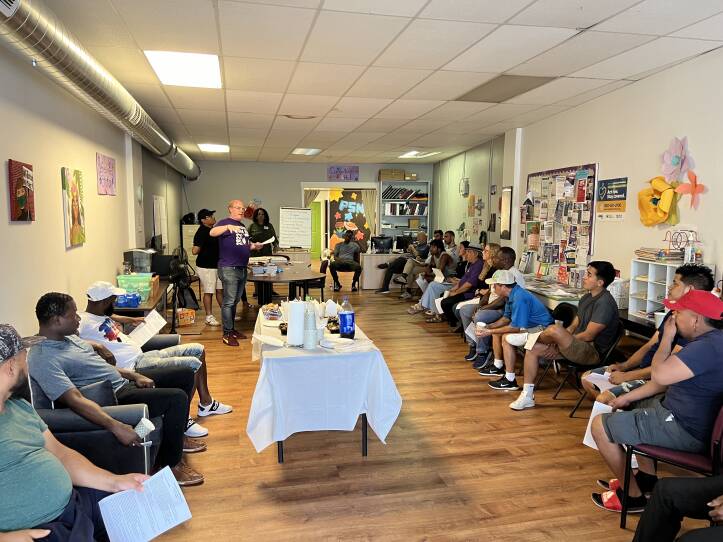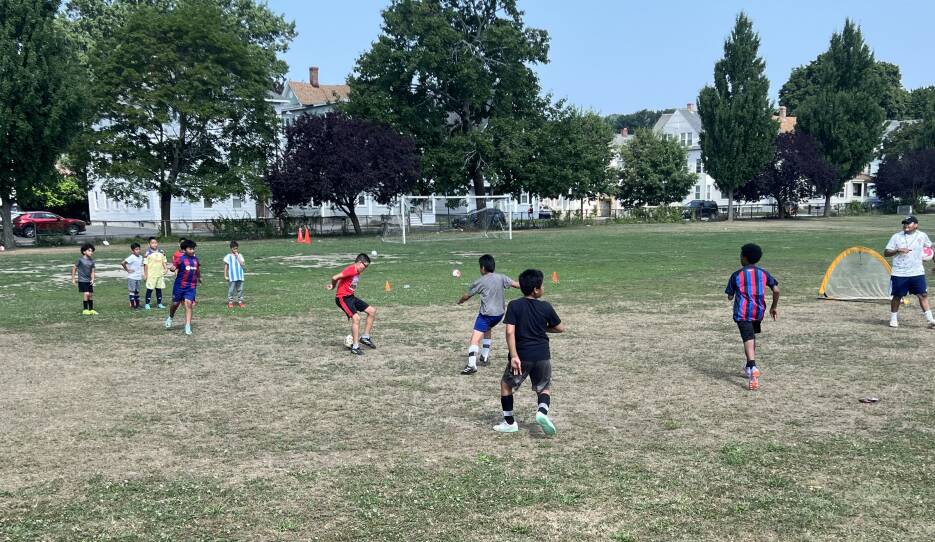More than a dozen soccer teams representing countries around the world. Passionate fans singing their teams’ anthems and banging drums, hoping to leave the stadium celebrating. Bragging rights and a part of history at stake.
Sounds like the FIFA World Cup, right?
Close, but no. This is the Worcester World Cup.
The three-day tournament runs from Aug. 9 to 11 this year and usually draws thousands of people for what has become a cultural tradition in New England’s second largest city. Not only does the competition help raise money for free youth soccer training in the area, it showcases Worcester’s diversity.
In a city where about 90 different languages are spoken and nearly a quarter of the population is foreign-born, the Worcester World Cup features teams ranging from Guatemala and Jamaica to Togo and Albania.
Players live in Worcester, and at least half on each team must descend from the country they’re playing for. Fans — many of whom are former refugees that have resettled in Worcester — show up to support their teams and connect with each other through music, food and, of course, the world’s most popular sport.
“Soccer is as relatable as music internationally,” said Adriana Ojeda-Joslyn, who oversees the Worcester World Cup as director of the local nonprofit Cultural Exchange Through Soccer.
“Being in this country or even in this neighborhood could seem scary and new if you just moved in. And so being able to navigate that alongside someone you can share an activity with, it goes a long way,” she added.

The Worcester World Cup started in 2006 as a way of celebrating the city’s diversity. Organizers had modest expectations for turnout, so they held it at a small park with no stands. But the tournament’s popularity quickly ballooned as more teams participated and fan attendance increased.
Organizers have since moved the World Cup to Foley Stadium with about 4,000 seats. The tournament, which takes nearly a year to plan, also includes an opening ceremony, youth exhibition match and awards presentation. Given the event’s popularity, Ojeda-Joslyn said she’s considering expanding it once again to include more games over a longer span.
“So much is jam-packed into a weekend” right now, she said. We may “host qualifiers to get into the Worcester World Cup … this would allow a lot more fun.”
A high-stakes process
This year’s World Cup features women’s and men’s single-elimination draws with four and 16 teams, respectively. Some of the players have played in college or semi-professionally. Although the squads participate in the tournament for fun, they take the event seriously, regularly practicing and even setting up exhibition matches with each other.
In the women’s tournament, Italy usually wins “pretty easily,” said Anne Hazel, who’s playing for Scotland, a new team this year. “We wanted a new group of people that could show some competition to team Italy.”
The high stakes were on display at a recent meeting to assemble the women’s and men’s brackets. Over Chinese takeout, team coaches and captains first introduced each other and listened to tournament organizers like Manuel Reyes-Ponce explain the rules for this year’s event.

Reyes-Ponce then began calling coaches up to a table in the middle of the room, where they anxiously pulled slips of paper out of bowls to determine their first-round matchups. The random selection process can be the difference between a team losing early and reaching the later rounds. Last year’s champion Brazil isn’t playing this year, but other traditionally strong squads like Liberia and Guatemala aren’t teams most players want to face in the first round either.
More Local News
As the team leaders realized who and when they’d play, some joked with one another, “You want to trade with me?” Other coaches and captains, including those from Cameroon and Ghana, playfully began talking trash when they learned their teams would square off.
“We know what they’re going to do. They’re going to try to go to penalty kicks,” Bandoh Osei, one of Ghana’s coaches, laughed.
“They’re not good at penalty kicks,” Cameroon’s coach, Achille Tchoubah, responded. “We’re going to win the game.”
Meanwhile, Nigeria’s coach Nonso Oneuzulike was more concerned about the time of his game than his opponent. Oneuzulike said his team includes 19-year-olds who don’t like to wake up early on weekends.
“Don’t tell me we’re the first game on Saturday. 9 a.m.?” Oneuzulike laughed, adding he may have to go to the players’ homes and awaken them himself. “It’s not good.”
More than just a soccer tournament
Competition — and waking up — aside, players and coaches said the Worcester World Cup means a lot more to them than winning games. They’re proud to do something that they say helps transcend barriers and unite people.
George Boley, who plays for his native Liberia and has lived in Worcester for 15 years, said he’s always been impressed that a place like Worcester can have so much cultural diversity.
“It’s not like a [big] city like New York or Washington, D.C.,” he said. “But in this little city, the people are just so blended in and so lovable.”
There’s another purpose to the Worcester World Cup that organizers tout. Its ticket sales help address an issue that fans and parents say is overlooked: the financial cost of youth sports.
Every Saturday, the Cultural Exchange Through Soccer hosts free practices for dozens of boys and girls who may not be able to afford private instructors and the hundreds of dollars in fees that travel leagues charge.

At one of the recent practices, Adriana Colon watched her two sons, ages 10 and 9, complete dribbling drills and scrimmage with nearly a dozen other children. At one point, she went over to her younger son to check if he was OK because he had just fallen.
“There’s lots of dirt in his hair,” she said, laughing after returning to her foldable chair. “We wanted to go out and eat afterward.”
Colon appreciates that the free training helps her save on other expenses like rent and groceries. She said her sons are especially passionate about soccer because of the Worcester World Cup, which they usually volunteer as ball boys for. Maybe one day, she said, they’ll play in the tournament.
“My oldest, in particular, has definitely mentioned playing. My younger one is more shy,” Colon said. “They’re definitely excited to be the ball boys this week.”









